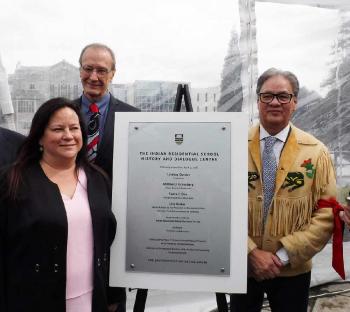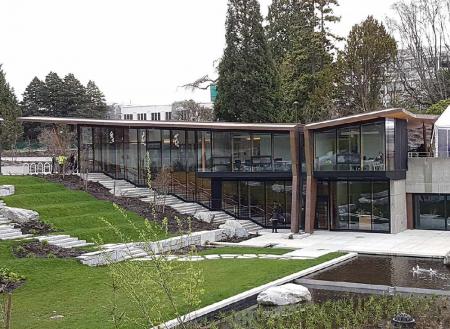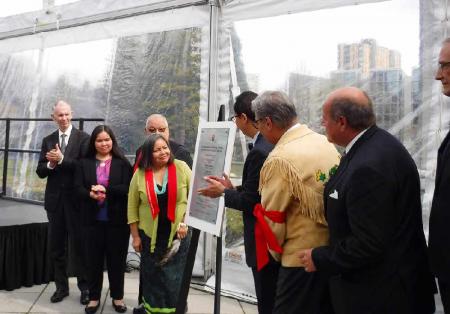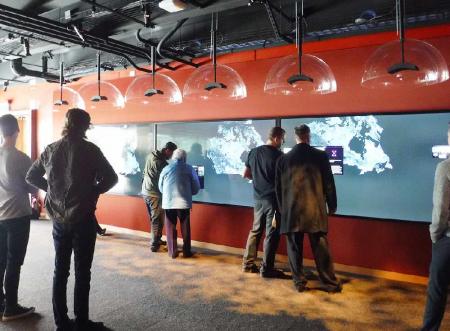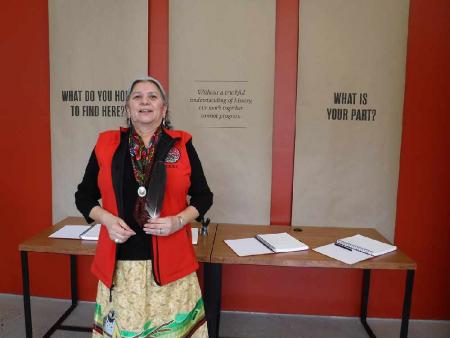Summary
{ALBUM_998731}
By Andrea Smith
Windspeaker.com Contributor
VANCOUVER
The University of British Columbia’s Indian Residential School History and Dialogue Centre officially opened April 9, marking a new start for many survivors who felt their voices had not been adequately heard throughout the decades.
UBC has officially pledged to continue the conversation about the residential school experience far into the future, working on behalf of survivors and the family members of survivors in an effort to keep Canada’s dark history from continuing to haunt them.
“On behalf of the university and all its people, I apologize to you, who are survivors of the residential schools… to your families, and your communities, and to all Indigenous people,” said UBC’s President Santa Ono during the opening ceremony, his voice noticeably cracking with emotion. “For the role that this university played in perpetuating that system, we apologize… For the actions and inactions of our predecessors, and (to) renew our commitment to working with all of you for a more just and equitable future here in British Columbia, as well as in Canada.”
According to Ono, the centre has multitude of purposes and uses. The first is to be a place for the public to access Truth and Reconciliation Commission records, and where survivors and the families of survivors can also share more of their experiences. Second it will support research on Indian residential schools and students’ experiences in residential schools in Canada.
Third, the centre will provide information in multiple ways, some of which on very large, digital screens with the intention to ensure people of all backgrounds and capabilities are able to use the sources. And fourth, the center is equipped with a comfortable lounge and board rooms so the centre can be used as a meeting place for scholars, social workers, researchers, survivors, and family members of survivors to ensure more important work continues on the issues of residential schools.
Linc Kesler, UBC’s director of First Nations House of Learning, spoke during the gathering, as did Carl Point from the Musqueam Nation, who shared a welcome song. Chief Wayne Sparrow of the Musqueam Nation also offered words of welcome.
Grand Chief Edward John shared a quick speech, which involved stories of his own experiences at Indian residential school, as well as the experiences of some of his family members.
“For all of us, not just Indigenous students on this campus, but for any others who go there to learn… there are countless stories about this country which are yet to be told… The dialogue generated during the last several decades must continue. This center must be an important and proactive catalyst for this. It is the moral imperative of the university,” he said.
John shared a story about his grandparents being threatened with arrest by RCMP for not sending John’s father to residential school. He also shared his particularly strong belief that if the current Pope could hear the stories of survivors, which will now be archived at the history and dialogue centre, the Pope would offer an official apology more readily. (This statement was in response to the Pope saying in March that he could not personally apologize for the Catholic Church’s involvement in the abuses perpetrated at Catholic-run residential schools.)
Nuu-chah-nulth Elder Barney Williams, and Syilx Elder Cindy Tom-Lindley also spoke to the gathering. Both are residential school survivors. Tom-Lindley is the executive director of the Indian Residential School Survivors Society, while Williams is a member of the National Center for Truth and Reconciliation Survivors Circle.
Adina Williams, a fourth-year UBC arts student from the Squamish Nation was also invited to speak, because of the work she’s been doing around the Lower Mainland teaching young people about reconciliation. She spoke of the immense frustration she felt once when a high school teacher denied that any abuse to residential school students ever occurred. Williams is happy to see the history and dialogue centre now standing to right that wrong.
“This is why the dialogue centre is not only a timely edition to UBC campus, but it is also a necessary one. The dialogue centre will play a critical role in closing these large knowledge gaps that have been present far too long,” she said, and offered acceptance of President Ono’s official apology.
After the opening ceremony, survivors and attending Elders were taken on the first public tour of the centre. Many of them were excited, but emotional, as the memories of their years in the schools were brought back. Some of the Elders flocked to the giant screens, with photo images, which they scrolled through, pointing out the people they recognized.
“I truly appreciate the statement made by the president of UBC and I encourage all people to go online and read the statement that he read out to us today,” said Joanne Lafferty, a resolution health support worker with the Indian Residential School Survivors Society. Lafferty has been working in this area for more than two decades.
“I’m proud of all of the workers that have contributed to making this facility a reality. It’s a great vision they’ve had, and to actually see it become what it is… and it’s just in its beginning stages… I look forward to coming back in a few years and seeing the growth,” she said.

